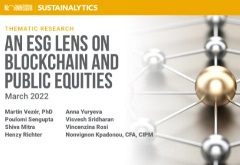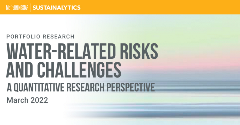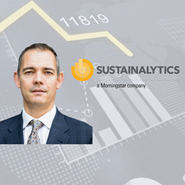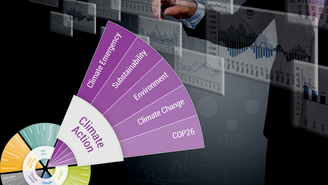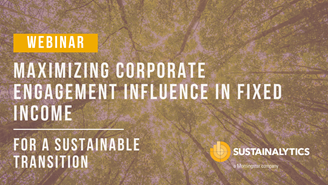Why ESG Investors Follow the Elon Musk Twitter Takeover
A self-proclaimed “free speech absolutist”, Musk has criticized what he views as excessive moderation on online platforms, indicating his desire to ease Twitter’s content moderation policies and only remove content deemed illegal by governments.
Cobalt ESG Risks Threaten Electric Vehicle Supply Chain
Transport electrification is at the forefront of the international climate transition agenda. Because of this, global demand for cobalt is projected to grow fourfold by 2030, which raises the question, are mineral supply chains robust enough to fuel a sustainable EV revolution?
Correlation of Business Ethics and Corporate Culture - 5 Lessons from the Banking Industry
To protect a company’s reputation and economic position, its employees play an essential part in organisational risk mitigation strategy by demonstrating consideration for systemic business risk, taking accountability, and being willing to escalate concerns. Companies with a strong, ethical corporate culture have much to gain—improved employee performance, morale, and retention, and in the long run, bolstering the bottom line.
The Governance of Autonomous Weapons: What Investors Should Know
The ethical implications of lethal autonomous weapons systems (LAWS), often referred to by their dramatic moniker ‘killer robots’, have long been a topic of interest. Until recently, debates about LAWS were relegated as hypothetical, with the technology assumed to be under development and out of reach. Such assumptions may be due for reevaluation, and while a firm conclusion is yet to be drawn, it is worthwhile presenting them to the ESG investment community.
Russia-Ukraine Crisis Could Spell Unforeseen ESG Risks for Insurers
The Russia-Ukraine conflict and the subsequent sanctions on Russian entities have led to material and wide-ranging impacts on diversified sectors and international firms. However, company disclosures and other sources suggest that the conflict’s primary impact on the global insurance industry is limited for two main reasons
The Emergence of Water Risk: From Marginal to Systemic
The past two decades have seen a surge in interest in environmental issues, mainly climate change, global warming, and fossil fuels. Yet, another equally important dimension - water scarcity - has thus far remained largely unexamined and has not been given adequate importance in the economic development agendas of many countries.
ESG Implications of Russia’s Invasion of Ukraine on the Chemicals Industry
The Russian invasion of Ukraine not only threatens global security, but it also raises some important ESG implications for several sectors, including the chemicals industry and particularly the agrochemical subindustry, as Russia exports over 10% of fertilizers globally.
An ESG Lens on Blockchain and Public Equities - Thematic Research Report
The investment risks and opportunities associated with blockchain go beyond the volatile cryptocurrency market, with applications ranging from enhanced payment platforms and contract execution to supply chain management and carbon tracking systems.
Water-Related Risks and Challenges
This report sheds light on the growing effects of water scarcity on companies and countries. To address these challenges, investors can use water reporting metrics to identify companies and countries with severe water risk. We further relate water metrics to firm and country characteristics and highlight substantial cross-sectional differences.
The Sustainability Conundrum of Living Income in Agriculture
Living Income is a crucial consideration among leading companies across some sectors and their supplier companies throughout the agricultural and food supply chain. Companies that manage ESG risk in their supply chains, making targeted investments to improve their resilience, are better positioned to build investor confidence.
What Happens When Companies are Receptive to Investor Feedback on ESG?
When companies are receptive to investor feedback, there are clear real-world impacts and positive changes. Such engagement outcomes vary and are directly tied to the company and its company-specific exposure to material ESG issues.
5 Sustainability Themes to Expect in 2022
As we enter 2022, it struck me that VUCA--a concept that originated in the mid-1980s at the U.S. Army War College to describe the volatility, uncertainty, complexity, and ambiguity of the world after the Cold War—is still a useful framework to think of where we are now.
Sustainalytics CEO Michael Jantzi on the Evolution of ESG and What's Ahead For Sustainable Investing
Michael Jantzi is one of the giants of sustainable investing. He is the founder and long-time CEO of Sustainalytics, which was recently sold to Morningstar, and where he now focuses on the big picture as managing director for ESG strategy.
For Investors with Ambitions to Lead on Climate Action Post COP26
In the weeks following COP26, investors in the UK and worldwide face a myriad of upcoming climate-related regulations heading towards the implementation phase. In addition, major global coalitions such as the Glasgow Financial Alliance for Net Zero have sprung up to attempt to accelerate decarbonization via targeted investment.
The Impact and Cost of Air Pollution: U.S. Petroleum Refineries
Investors can examine to what extent petroleum refiners manage their Non-GHG Air Emissions and assess the quality of a company's programs to reduce air pollutants. For instance, examining all the petroleum refiners assessed by Sustainalytics, we observe that only 3% have a strong program to manage non-greenhouse gas emissions.
Biodiversity: A Crisis Equaling, Possibly Exceeding, Climate Change
According to the UN’s Convention on Biological Diversity the main drivers of biodiversity loss are habitat loss and degradation, climate change, pollution, over-exploitation, and invasive species. Habitat loss is directly linked to the conversion of natural ecosystems to agricultural lands and unsustainable use of water resources.









